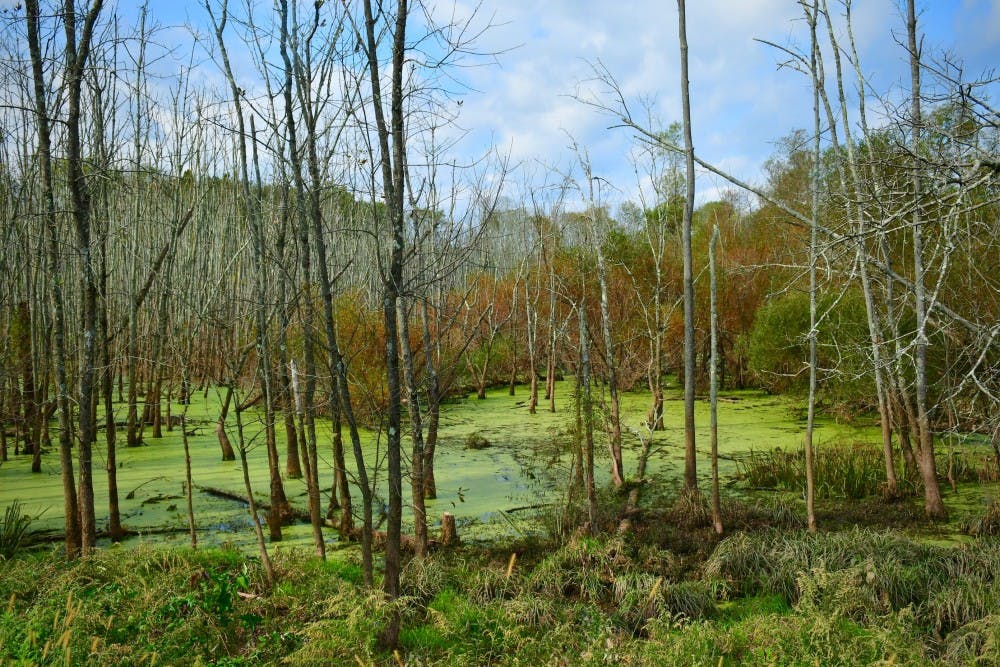As our leaders equivocate and waver, we, the undersigned, will strike with other climate-concerned young people around the world this Friday, Sept. 20. Coinciding with the start of the UN Climate Action Summit in New York, we strike for stronger action on the climate crisis.
We — graduate students at the Wilson School — take seriously our charge to act “in the nation’s service, and in the service of humanity.” The climate crisis presents an existential threat to our shared future, and as policy practitioners, we will spend our careers grappling with this crisis in all its configurations. The growing threat of floods and wildfires will fundamentally reshape our debate on fair housing and healthcare, extreme weather events will become more common — stifling development of fragile nations — and displacement (both internal and, to a lesser extent, cross-border) will increase as a changing climate remakes the world for the worse.
Some experts say we have just 18 months to prevent the most catastrophic of these impacts.
There are few policy problems where the science is so settled, yet our leaders have not faced up to the urgency or significance of the crisis. In the 2015 Paris Agreement, the world’s nations committed to a global target of 2.7–3.6°F warming, the bare minimum required to avoid a large scale ecological breakdown. On current trends, however, we will reach 5.6°F of warming by the end of the century, which will have disastrous social and ecological consequences.
We strike for action because of the devastating effects of rapid climate change on communities around the world, particularly on those least to blame for our current situation. Droughts and warmer temperatures are decreasing crop yields and increasing the spread of infectious diseases. Experts estimate 400,000 people die each year due to climate change, and casualties multiply when considering those who die prematurely from exposure to fossil fuel poisons in our air and water. The ranks of those displaced by climate change continue to swell with families leaving homes overrun by rising seas, while others flee armed conflict fueled by severe drought. Meanwhile, international and domestic norms and commitments to the rights of displaced people are crumbling. This injustice must incite a call to action.
Just as impacts are global, they are also very local. Policymakers are already considering which coastal cities are worth the investment of protecting with sea walls and infrastructure upgrades, and not every New Jersey community will make the list. The most vulnerable communities — people of color and low-income families — will likely lose out. New Jersey is one of the fastest-warming states in the continental United States, and drastic temperature increases are already taking their toll. While still tackling the costly damage from natural disasters, including Hurricane Sandy, New Jersey is losing its shoreline to a local sea rising at twice the global rate, and a changing climate has brought on large-scale algae blooms and disease-carrying mosquitoes.
While many countries will come to the UN Climate Action Summit next week earnestly seeking meaningful progress on the Paris Agreement, the United States — now withdrawn from the Agreement — and other nations remain stubbornly beholden to a fossil fuel industry that has long exercised its corrupting influence around the world. The situation is dire, a joint result of years of inaction interwoven with ongoing efforts to unravel the few policies in place that combat climate change. There are many potential pathways to lower emissions, such as cap and trade systems, carbon taxes, reforestation, and investment in new clean energy technologies. However, these all require policy changes and an engaged public dedicated to climate action. Managing damage control tomorrow will be far more expensive than mitigating the crisis today.
Striking for action communicates the need for immediate and comprehensive solutions. As policymakers, we understand that the impact of the climate crisis stretches across every public policy discipline. We also understand that elected officials respond to public pressure, and that pressure is exactly what we hope to achieve with our demonstration.
This Friday, Sept. 20, we join millions around the world in a Global Climate Strike to make our voices heard at the Summit in New York. It’s time to act like our house is burning down — because it is.
The event will begin in Hinds Plaza at 12:30 p.m. We will then march through town and onto the University campus. We hope you will join us. RSVP to the event here.
Tom Taylor, Sujata Rajpurohit, Molly Brune, Ryan Warsing and Sagatom Saha are graduate students at the University.
With contributions and endorsement from the following graduate students:

Meghana Mungikar
Fatima Khan
Henrietta Smith
Aaron Charlop-Powers
Katrina McLaughlin
Gur Yalon
Tom Clark
Julia Herrle
Patrick Boduch
Yashna Gungadurdoss
Kevin McCarthy
Maggie Tennis
Hélène Benveniste
Anne Kuhnen
Maisie Anderson-Davis
Richard André
Jenna Mellor
Talia Gerstle
Maya Aronoff
Elie Amkraut
Malini Nambiar
Ian Hutchcroft
Emily Andrews
Julia Tuttle
Corbin Stevens
Bryan Thomson
Zach Zook
Emily Tenenbom
Spogmay Ahmed
Lindsay Wylie
Tyler Patrick
Alli Divine
JR DeLaRosa
Maria Cecilia Romano
Luciana Debenedetti
Mark Lee
Maya Hardimon
Dylan Sullivan
Alex Hydrean
Galen Hunt
William McMutuary
Brody Viney
María Alejandra Moscoso
Emily Apple
Jennifer Johnson
Wendy Gomez
Jatin Batra
Lauren Clark
Ashwin Warrior
Liza Paudel
Daniel Pontón
Riley Edwards
Robert Francis
Nathan Babb
Gabriel Mekbib
Gelila Terrefe
Bing Lin
Yvette Ramirez
Alex Merchant
Clarke Wheeler
Sofia Alessandra Ramírez
Sri Harshita Rallabhandi
Joseph Tso
Renee Peterkin
McKenzie Leier
Ellinore Ahlgren
Danielle Hull
Christopher Crawford
Tiffany M. Tran
Rebecca Gorin
Pooja Ramamurthi
Claire McGuinness
Marilu Corona
Anthony Chase
Anh Ton
Djeniffer Melo
Jasmine Pineda
Theo Wilson
Jonathan Barnett
Mark Jahnke
Francisco Diez
Jake Gutman








